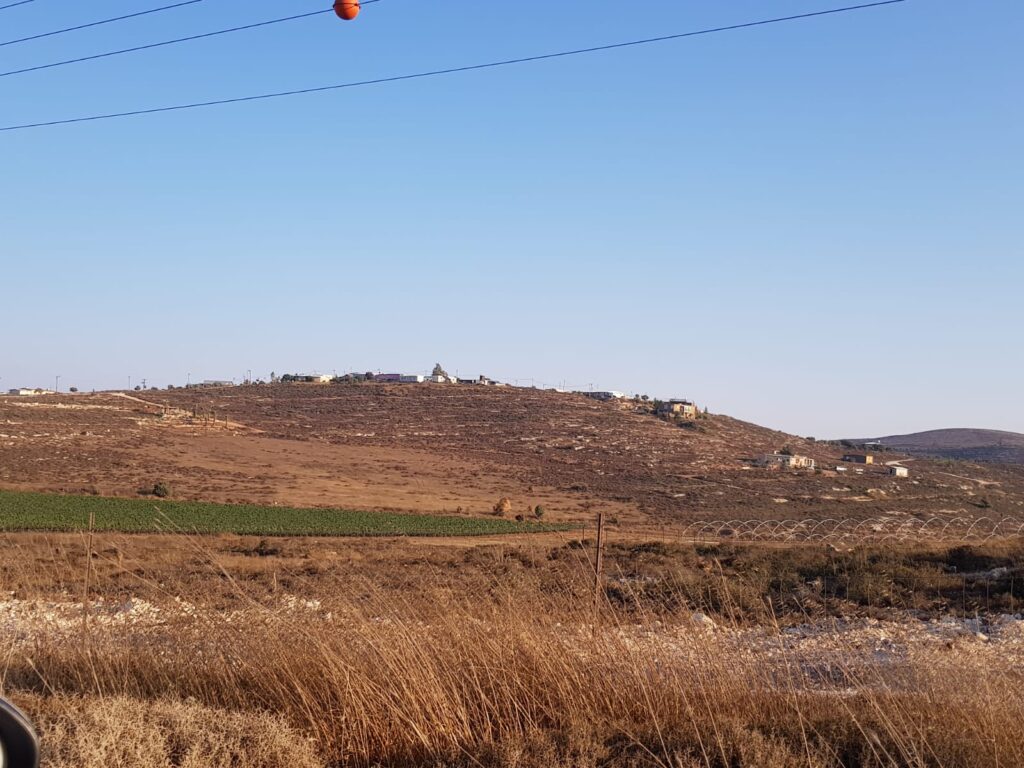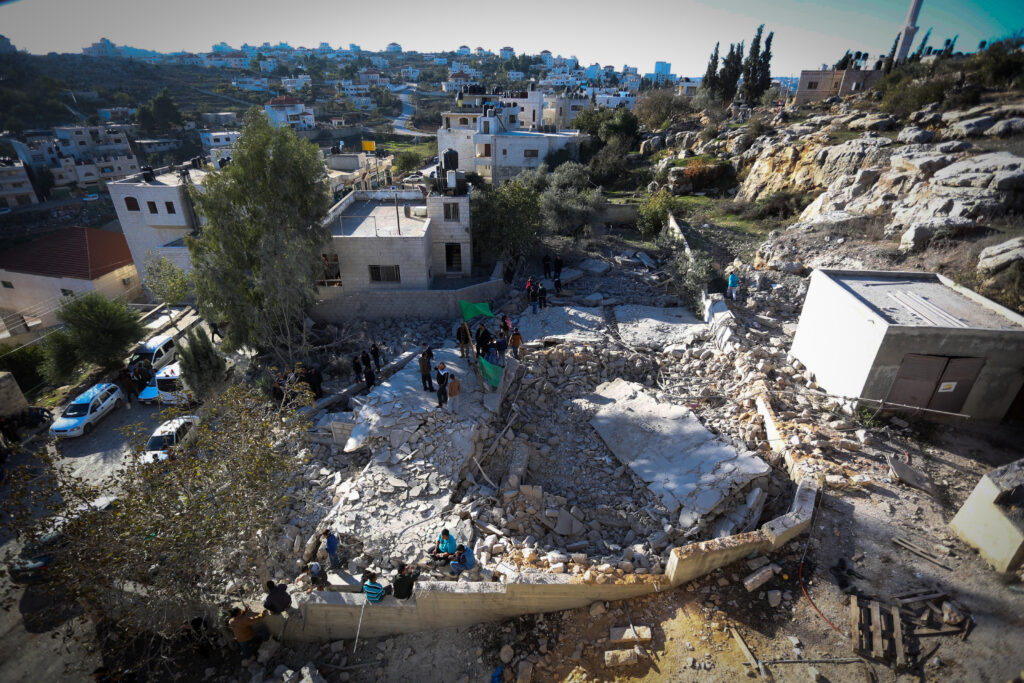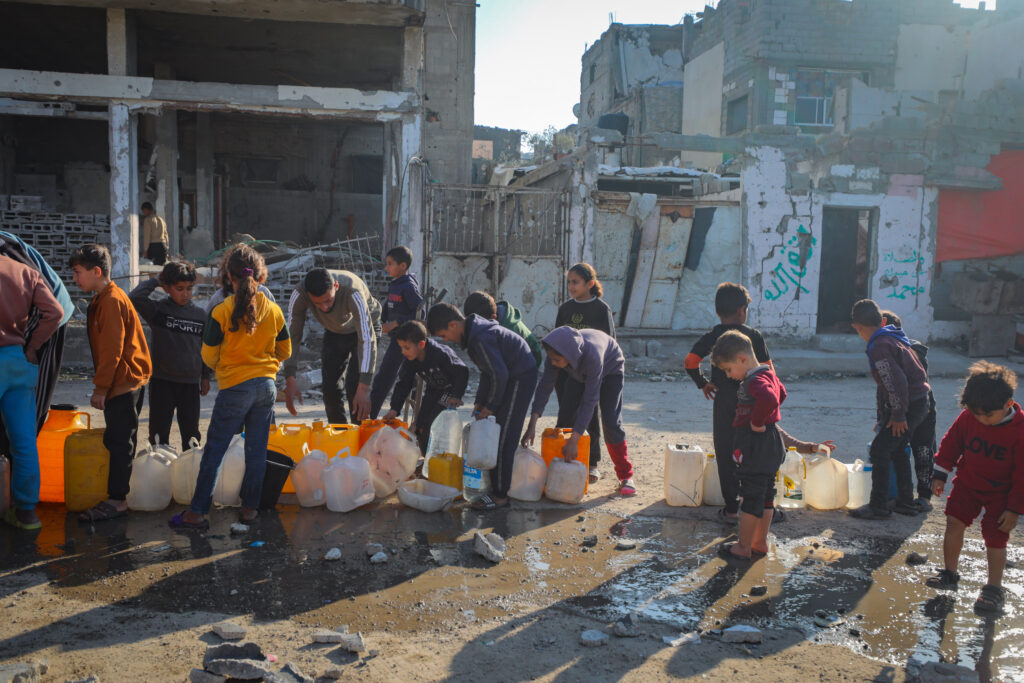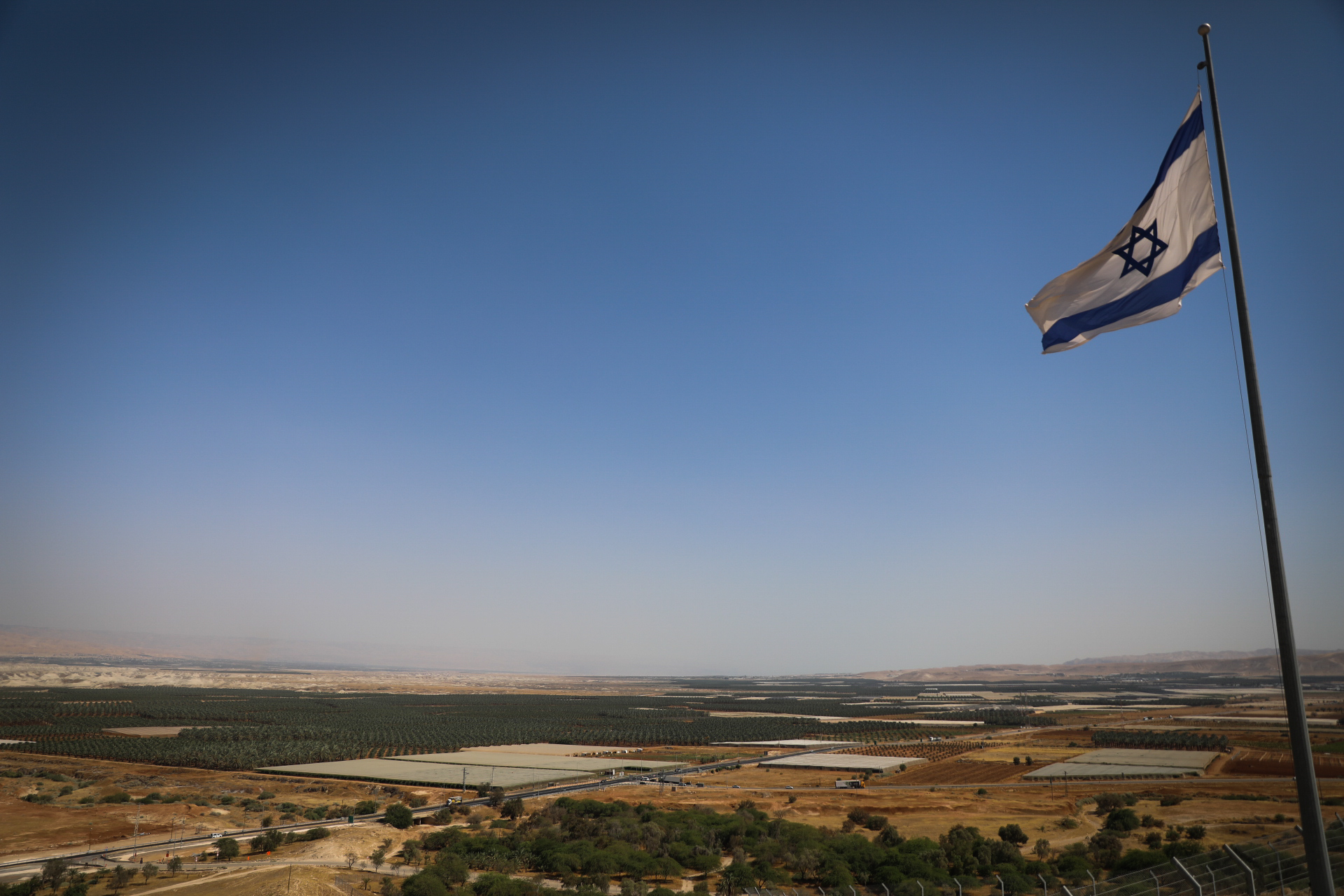When 19-year-old David Libi was killed last month in Gaza, Israelis learned only his name and age—identified as a civilian contractor for the Israel Defense Forces. But his story reveals something far more profound: a multigenerational commitment to Jewish settlement that has transformed nearly 85,000 dunams of biblical heartland into thriving communities, and a family whose bulldozers now serve dual purpose, building Jewish towns by day and destroying Hamas infrastructure by night.
David couldn’t enlist in the IDF due to medical reasons. Instead, he joined his father’s company, Libi Construction and Infrastructure, which provides vital excavators and bulldozers to the Israeli military in Gaza as equipment becomes stretched thin during the war. The work was grueling and dangerous, requiring systematic destruction of terror infrastructure hidden within every building in the Strip. He died when his bulldozer struck an explosive device in Jabaliya, part of what his father Eliav calls “seder ha’avodah“—the order of work—his term for labor that serves both practical and divine purposes.
The phrase carries profound meaning for the Libi family, rooted in their understanding that the Temple’s sacrificial order represents the ultimate fusion of material work and spiritual purpose. “God wants us to engage in practical work,” explains Eliav, a soft-spoken 40-year-old whose weathered hands reflect decades of settlement construction. “Most commandments [in the Bible] involve agricultural work, with crops and livestock. From this comes our service of God in places under fire, at the spearhead of the battle for the land. This is greater than merely fulfilling commandments—it’s the very heart of Israel’s mission to merit Temple service.”
A Defense Ministry civilian contractor was killed by an explosive device during IDF operations in the northern Gaza Strip earlier today, the military announces.
— Emanuel (Mannie) Fabian (@manniefabian) May 29, 2025
He is named as David Libi, 19, from the West Bank settlement outpost of Malachei Shalom.
Libi was operating heavy… pic.twitter.com/6xn1Eu8lap
————————————————————–
Jewish Farms Under Attack – Your Help Needed
Every day, Arab terrorists target Judea and Samaria, where they are systematically destroying Jewish farms with arson and violence. Brave Israeli farming families like the Libis are the last line of defense, putting their lives on the line to protect and hold onto every inch of this sacred soil. Your support gives these heroes the tools they need to defeat the terrorists. Donate today!
———————————————————–
This ideology permeates everything the family does, from their systematic establishment of farms and communities across Judea, Samaria, and the Jordan Valley, to their company’s current mission destroying Hamas bunkers and booby-trapped buildings that protect Israeli soldiers from entering death traps. For the Libis, there is no separation between settlement work and warfare, between farming and faith, between building Jewish communities and defending them.
The Pioneer Legacy
The Libi story begins with Rabbi Yaakov Libi, David’s grandfather, who settled in Shiloh nearly four decades ago as part of the early wave of Jewish return to the biblical heartland. His son Eliav absorbed the pioneering ethos from childhood, watching the establishment of nearby settlements like Rachelim and Shvut Rachel in memory of Rachel Druck, who was murdered by terrorists. By age six or seven, young Eliav was participating in prayer services at new outposts, walking on foot to complete the required quorum of ten men for communal prayer and working alongside settlement leaders like the late Yossi Shukr in olive groves near what is now the community of Kida.
“Yossi would stand with me, looking at the landscape, and tell me: ‘Eliav, only eastward—that’s the challenge,'” Libi recalls, his eyes tracking toward the Jordan Valley where his family now operates their newest farm. Those words proved prophetic, as the family has indeed moved steadily eastward over the decades, establishing a chain of agricultural settlements that stretches from the hills of Shiloh to the fertile plains near Jericho.
After the 2005 Gaza disengagement—when the Israeli government expelled all Jews from Gaza in a disastrous move that ultimately enabled the Hamas massacre of October 7, 2023—Eliav met Sarah Skali, whose brother had already established hilltop outposts near the settlement of Itamar. Sarah, four years older and raised in Jerusalem’s Kiryat Moshe neighborhood—a hub of settlement activism—shared Eliav’s vision completely. “I always told myself: I hope I find someone who establishes such places,” she remembers. “If not, at least someone who wants to join a place that’s just beginning.” Their courtship conversations centered entirely on settlement plans, and they married after just two months of dating.
Rather than settle permanently in any existing community, the couple immediately began their pioneering mission, moving to Adei Ad (Hebrew for “forever and ever”), a community in Samaria that was recently formally recognized as a legal town by the Israeli government, with the goal of establishing new settlements in the surrounding hills.

Life in the Wilderness
What followed were years of conditions that would challenge the most hardened pioneers. Eliav initially lived at the new site with unmarried volunteers in an old car, later joined by his brother Harel, who moved in with his wife and infant daughter in an abandoned bus. The Libi family, with two small children, became the second family to join them.
“We lived in old buses with no electricity,” Eliav explains. “We did laundry in our caravan back in Adi Ad, going up and down all day.” David was five years old during this period, already absorbing the pioneering lifestyle that would define his short life. The family recalls him speaking with remarkable passion about their eastward mission, pointing toward Bedouin areas and declaring his vision to settle there someday. Today, those areas are indeed under Jewish control.
After three years of holding the site, security forces evicted the families and demolished their structures. Rather than retreat entirely, the Libis returned to Adei Ad and built at the settlement’s most remote edge, gradually stretching its boundaries eastward. Their strategy worked: today that area has become a large, developed neighborhood, and the original Gal Yosef site has been incorporated into Adei Ad’s official master plan.
The pattern established here—initial settlement in harsh conditions, gradual legitimization, and expansion to new frontiers—would repeat throughout the family’s pioneering work. “We understood that our mission of establishing facts on the ground in Adei Ad was complete,” Eliav explains. “The herds and Bedouins who had left the area never returned.”
The Camouflaged Settlement
Following the murder of Malachi Rosenfeld in 2015, the Libi family joined the establishment of “Malachi’s Peace,” built on an abandoned IDF training base from 1978 that had been taken over by Bedouins after the Oslo Accords led to the evacuation of military installations from Judea and Samaria. After initial attempts to settle in an area without clear land status, security forces asked them to move to a more legally defensible position.

What happened next reads like something from a frontier novel. The families brought massive amounts of hay to their new location, ostensibly for livestock, though the animals actually grazed freely on nearby natural vegetation. They hollowed out cavities within the hay piles and lived inside the camouflaged structures for months.
“We faced snakes, insects, mice, and everything imaginable,” Eliav recalls. “It was an extremely challenging period lasting several months.” The entrance to their hidden home was a pathway through the hay stacks, invisible from outside. Sarah, whom Eliav describes as a “fighter” rather than merely someone who goes along with his plans, adapted to these primitive conditions with remarkable resilience.
“We had gas and generator power,” she explains matter-of-factly. “We built temporary bathrooms and even a shower and kitchen, entering our home through a hallway that passed between hay piles. From outside it looked like hay alone.” After several months, they replaced the hay with caravans built in Shiloh, covering them with the same tarps used for hay and maintaining the camouflaged entrance. “We lived this way for months more without the Civil Administration realizing there were caravans underneath. We didn’t open windows, so from the outside it still looked exactly like hay piles.”
The deception worked until 2021, when the Bennett-Lapid government decided that any settlement point established before their administration would remain standing. “Slowly we emerged from hiding,” Eliav says. “We built our Sukkah [for the Feast of Tabernacles] for the first time out in the open, and afterward began opening windows in our covering.”
A Life of Sacred Work
David was born into this pioneering lifestyle, literally delivered in his grandfather’s car at the Ofra junction when his parents couldn’t reach the Jerusalem hospital in time. Rabbi Yaakov Libi recalls having a special connection with his grandson, who spent considerable time at his grandparents’ home in Shiloh while his parents worked on farm establishment.
“When he was older, he spent many hours at our house because his parents were very busy establishing the farms,” Rabbi Libi explains. “He often came to us straight from school. I also celebrated his bar mitzvah and taught him to read from the Torah.” The grandfather describes David’s profound connection to settlement work: “When the children played, they were always establishing settlements. All their occupation was this construction. They played in the sand next to our house, later turning the sand into models of the Holy of Holies, because essentially all this settlement is preparation for the Holy of Holies.”
David Libi was 19.
— Yehuda Teitelbaum (@chalavyishmael) May 29, 2025
He was killed by a Hamas roadside bomb while operating a bulldozer to clear terror infrastructure in Gaza.
Tonight, his yeshiva released a video of him singing.
A soft voice. A pure soul. A boy who gave everything to protect his people.
HY"D 💔 pic.twitter.com/fUh8y3bAF1
This religious framework shaped every aspect of David’s upbringing. In a bar mitzvah video that surfaced after his death, David is seen ensuring that sheep in the communal pen would be kosher for Temple sacrifice, checking that they bore no disqualifying markings. For religious Jews who anticipate the rebuilding of the Third Temple in Jerusalem, such attention to ritual purity reflects their belief that they are actively preparing for the restoration of biblical worship.
The family’s commitment to this vision is total. All profits from Libi Construction, which at peak season employs over 300 people, fund their settlement work. Neither Eliav nor his brother owns a private apartment; everything is invested in land acquisition and farm development. “This is a company for building the land, and its profits also go to settling the land,” Sarah explains. “This is our blessing: God knows we do good things with it, so it works. We operate with divine assistance.”
The Gaza Mission
When Israel launched its current Gaza offensive, David immediately volunteered to deploy with the bulldozer crews. His motivation was both personal and theological. Unable to serve in combat due to his medical profile, this civilian contractor role represented his contribution to what the family sees as a holy war for Israel’s survival.
“David was raised to live constantly in a state of preparation,” his father explains. “He would rise early to study sacred texts and lived with this matter in completeness and joy. During the recent Passover, I saw his unique connection to path-clearing and road-building. He had a special connection to this work. We don’t work on intermediate festival days, but regarding this, it’s more than work—it’s warfare for settling the land. From this understanding we merited canceling our holiday rest.”
The family’s company had been called upon by the Defense Ministry due to equipment shortages in Gaza and the need for experienced operators who understood the mission’s importance. “They said there weren’t enough tools in Gaza and they needed operators with experience for whom the mission was important,” Eliav explains. “Within a short time we entered operations and achieved good results, though we lost a lot of money on damage the equipment sustained.”
The cemetery in the community of Malachei Hashalom, Binyamin, where David Libi will be laid to rest, was established within hours following his death on Thursday during an engineering operation in Gaza.
— Netanel Worthy – נתנאל וורתי (@NetanelWorthy) May 30, 2025
An hour after the tragic news was received, Israel Ganz, head of the… pic.twitter.com/ogle11xXGL
The work was systematic destruction of Hamas infrastructure, building by building, as Israeli military doctrine evolved to prioritize soldier safety through comprehensive demolition rather than dangerous house-to-house searches. “The mission is to destroy terror infrastructure in Gaza,” Eliav states plainly. “In other words: to demolish the houses, because every house contains terror infrastructure.”
David typically worked weekend shifts while studying at the Telem yeshiva during the week, later transitioning to full-time deployment in Gaza. His parents supported his decision despite their fears. “From my perspective, yes, it was obvious,” Sarah says of David’s Gaza deployment. “David very much wanted to enlist but had a low profile. When he said he could go down to Gaza this way, I even rejoiced with him.”
The dangerous nature of the work was clear to everyone. “The army immediately saw our very high capabilities,” Eliav notes. “Enormous damage is caused to our equipment there, but we understand the mission’s magnitude. The IDF wants to destroy as much as possible there. Ultimately, this is the central action in this war.”
The Ultimate Sacrifice
David’s death came during what his family describes as the most intense period of infrastructure destruction, when Israeli forces were methodically clearing Jabaliya of Hamas positions. His bulldozer struck an explosive device while demolishing terror infrastructure, killing him instantly. At just 19, he died performing what his family considers sacred work—simultaneously serving Israel’s military needs and fulfilling the biblical commandment to possess the land.
“Being a soldier isn’t about the military ID number someone receives or the uniform he wears,” Rabbi Libi explains. “It’s the feeling of mission in the soul. David lived as a soldier constantly. Everything he did, he did as a soldier. Though the IDF classified him as a contractor, he was serving Israel and serving God.”
The family’s response to David’s death reflects their unwavering commitment to their mission. Rather than retreat or question their path, they accelerated their settlement activities. In David’s memory, three new communities have been established: David’s Shield (Magen David), David’s Fortress (Metzudat David), and David’s Song (Michtam l’David). Each bears his name and represents the family’s conviction that Jewish presence must be established throughout the biblical heartland.

Building Through Tragedy
The scope of the Libi family’s settlement enterprise is staggering by any measure. Their farms span 85,000 dunams—nearly a quarter the size of the Gaza Strip—stretching from the hills around Shiloh to agricultural areas near Jericho in the Jordan Valley. They have established dozens of settlement points, many beginning as illegal outposts that later received government recognition and infrastructure connections.
Recent additions include Havat Taanah (Farm of Taanah), where the Karu family operates in memory of Malachi Rosenfeld; Havat Shalisha; Havat Netiv HaGdud; and their newest farm, Mitzpeh Michal, where the family moved shortly before David’s death. Named after Michal Adato, an IDF education corps officer murdered by a terrorist at the Tomer junction in 1998, the farm represents the family’s continuing eastward expansion.
“There’s a real connection here,” Eliav explains of the naming choice. “This is the place where her soul ascended, which led to connection with the land and connection between us and the settlement.” The farm began as a road-clearing operation during the early months of the current war, gradually developing into a fortified position where David spent many nights on guard duty before the family’s permanent relocation there.
Their construction company has become the primary contractor for settlement infrastructure projects throughout Judea and Samaria, often working under dangerous conditions or tight deadlines. Recent projects include renovating the Jewish settlement in Homesh, purchasing buildings in eastern Jerusalem, and opening the strategic Bruchin South dirt road after the murder of Tsela and Rabid Gaz. The company also operates building supply stores in Neriya and concrete plants in Kerem Re’im and Itamar to provide comprehensive construction services for the settlement enterprise.
The Educational Mission
An unexpected dimension of the family’s work has been their role in educating young volunteers who come to help with farm operations. “When we set out on the road in Gal Yosef, our goal was a settlement project,” Eliav explains. “Over time we discovered more and more the secret of agriculture and found ourselves running an educational program.”
The farms regularly host dozens of young volunteers from religious Zionist backgrounds, providing them with hands-on experience in agriculture and settlement while instilling the family’s ideology of “work as worship.” These programs have proven so successful that military commanders who initially opposed the family’s settlement activities came to support their educational mission.
“There’s something special about this, because it’s the first time the youth isn’t facing his rabbi or his father. He’s with you out of complete choice, from a desire to come help you,” Eliav observes. “This allows him to hear you more and receive from you more. It also gives him a feeling of meaning and deep connection, and from its side this is a very great commandment that strengthens whoever engages in it.”
This educational component has become central to the family’s mission, as they see their farms as training grounds for the next generation of settlement leaders. Many former volunteers have gone on to establish their own outposts or join existing settlement communities throughout Judea and Samaria.
Faith Under Fire
The family’s theological framework provides them with remarkable resilience in the face of repeated setbacks, legal challenges, and personal tragedy. When government forces demolish their structures, they view it as temporary obstacles rather than permanent defeats. When Bedouins or Palestinian activists stage protests, they see confirmation that their settlement work is strategically important. When their beloved son dies in combat, they draw strength from viewing his death as divine providence that demands even greater commitment to their mission.
“I don’t feel somehow guilty, that if I had chosen differently then it would have been different,” Eliav explains regarding his decision to purchase equipment for David’s Gaza deployment. “I believe that God directs His world to do as He wishes, and that He decreed that it would be thus. I don’t think a soul rises and ascends to the level of those killed for the sanctification of the Name because the father decided to buy equipment or not. It’s clear that this is above us. The Holy One Blessed Be He decided, but still He chose me to be part of this sacrifice.”
This theological acceptance doesn’t diminish the family’s grief, but it provides a framework for understanding David’s death as meaningful rather than senseless. “David couldn’t formally enlist due to medical reasons, yet he found his way to serve at the spearhead of Israel’s most important military mission,” Sarah reflects. “He believed this was his contribution to the war, and we supported him despite our natural fears.”
The family’s broader mission continues with undiminished intensity. Their construction company maintains 24 bulldozers, with eight currently deployed in Gaza for IDF operations. The work there involves systematic destruction of terror infrastructure while protecting Israeli soldiers from the booby traps and ambushes that characterized earlier phases of the war.
“The army immediately recognized our very high capabilities,” Eliav noted. “Enormous damage was caused to our equipment there, but we understood the mission’s magnitude. The IDF wanted to destroy as much as possible there. This was the central action in this war.”
The Continuing Vision
Speaking from their new home in Mitzpeh Michal, overlooking the Jordan Valley where their ancestors Abraham, Isaac, and Jacob once traveled, the family articulates their continuing mission with quiet determination. Their newest farms represent not just agricultural development but strategic positioning for what they see as the final phase of Jewish settlement in the biblical heartland.
“Our challenge as pioneers is to succeed in preserving the essence of working the land,” Eliav explains. “Our mission in establishing farms isn’t just to set up as many settlements as possible, but mainly to turn agricultural society into a complete society of working the land and bringing the service of God into it. This is true even when we don’t succeed in being economical. We believe and know that from the difficulties will also come the blessing of ‘eating from its fruit and being satisfied from its goodness.'”
As Eliav surveys the Jordan Valley from his new home, his words carry the same eastward vision that animated his mentor Yossi Shukr decades ago: “Our work is transforming these farms into lasting towns and cities, ensuring Jewish presence on every hill and valley of this land.” For the Libi family, David’s sacrifice has only strengthened their faith in this ancient promise and their commitment to its modern fulfillment.
Sources: Arnon Segal, “Seder Ha’Avodah” (Olam Katan); Yosef Erenfeld, “Libi B’Mizrach” (B’Sheva)
Support Jewish Farms in Judea and Samaria
Every day, Arab terrorists target Judea and Samaria, where they are systematically destroying Jewish farms with arson and violence. Brave Israeli farming families are the last line of defense, putting their lives on the line to protect and hold onto every inch of this sacred soil. Your support gives these heroes the tools they need to defeat the terrorists. Donate now!





